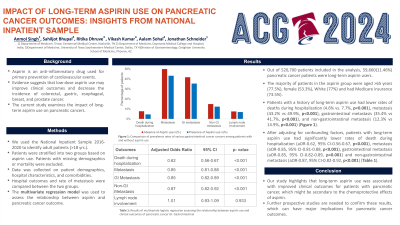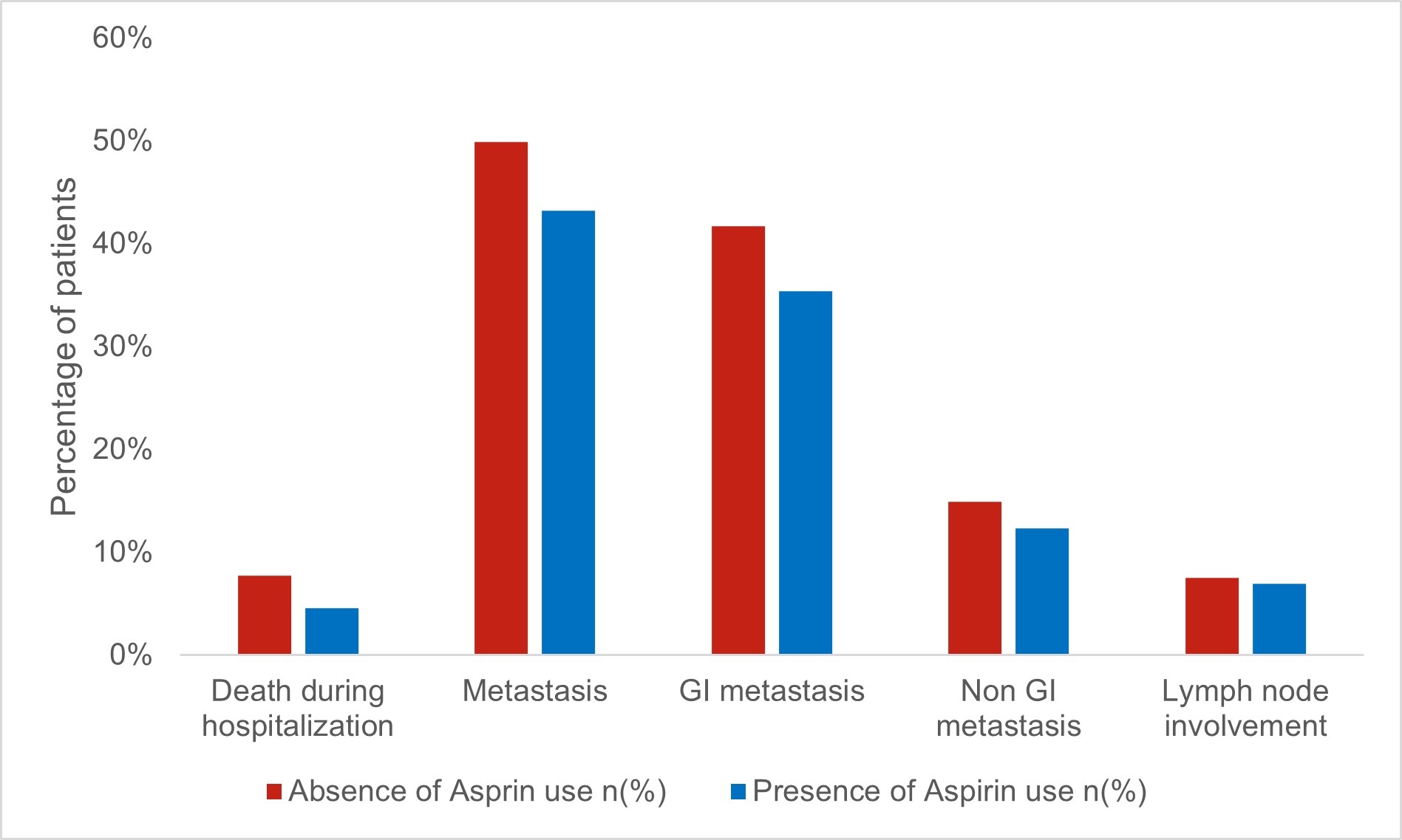Sunday Poster Session
Category: Biliary/Pancreas
P0051 - Impact of Long-Term Aspirin Use on Pancreatic Cancer Outcomes: Insights from National Inpatient Sample
Sunday, October 27, 2024
3:30 PM - 7:00 PM ET
Location: Exhibit Hall E

Has Audio
- AS
Anmol Singh, MBBS
Tristar Centennial Medical Center
Nashville, TN
Presenting Author(s)
Anmol Singh, MBBS1, Sahiljot Bhupal, MBBS2, Vikash Kumar, MD3, Ritika Dhruve, MBBS4, Aalam Sohal, MD5, Jonathan Schneider, MD1
1Tristar Centennial Medical Center, Nashville, TN; 2Dayanand Medical College and Hospital, Chicago, IL; 3Creighton University School of Medicine, Brooklyn, NY; 4University of Texas Southwestern Medical Center, Dallas, TX; 5Creighton University School of Medicine, Seattle, WA
Introduction: Aspirin is an anti-inflammatory drug used for primary prevention of cardiovascular events. Evidence suggests that low-dose aspirin use may improve clinical outcomes and decrease the incidence of colorectal, gastric, esophageal, breast, and prostate cancer. The current study examines the impact of long-term aspirin use on pancreatic cancers.
Methods: We used the National Inpatient Sample 2016-2020 to identify adult patients ( >18 yrs). Patients were stratified into two groups based on aspirin use. Patients with missing demographics or mortality were excluded. Data was collected on patient demographics, hospital characteristics, and comorbidities. Hospital outcomes and rate of metastasis were compared between the two groups. The multivariate regression model was used to assess the relationship between aspirin and pancreatic cancer outcome.
Results: Out of 520,700 patients included in the analysis, 59,660(11.46%) pancreatic cancer patients were long-term aspirin users. The majority of patients in the aspirin group were aged >65 years (77.5%), female (53.3%), White (77%) and had Medicare insurance (73.5%). Patients with a history of long-term aspirin use had lower rates of deaths during hospitalization (4.6% vs. 7.7%, p< 0.001), metastasis (43.2% vs 49.9%, p< 0.001), gastrointestinal metastasis (35.4% vs 41.7%, p< 0.001), and on-gastrointestinal metastasis (12.3% vs 14.9%, p< 0.001) (Figure 1). After adjusting for confounding factors, patients with long-term aspirin use had significantly lower rates of death during hospitalization (aOR-0.62, 95% CI-0.56-0.67, p< 0.001), metastasis (aOR-0.85, 95% CI-0.81-0.88, p< 0.001), gastrointestinal metastasis (aOR-0.85, 95% CI-0.82-0.89, p< 0.001) and non-gastrointestinal metastasis (aOR-0.87, 95% CI-0.82-0.92, p< 0.001) (Table 1).
Discussion: Our study highlights that long-term aspirin use was associated with improved clinical outcomes for patients with pancreatic cancer, which might be secondary to the chemoprotective effects of aspirin. Further prospective studies are needed to confirm these results, which can have major implications for primary prevention of pancreatic cancer

Note: The table for this abstract can be viewed in the ePoster Gallery section of the ACG 2024 ePoster Site or in The American Journal of Gastroenterology's abstract supplement issue, both of which will be available starting October 27, 2024.
Disclosures:
Anmol Singh, MBBS1, Sahiljot Bhupal, MBBS2, Vikash Kumar, MD3, Ritika Dhruve, MBBS4, Aalam Sohal, MD5, Jonathan Schneider, MD1. P0051 - Impact of Long-Term Aspirin Use on Pancreatic Cancer Outcomes: Insights from National Inpatient Sample, ACG 2024 Annual Scientific Meeting Abstracts. Philadelphia, PA: American College of Gastroenterology.
1Tristar Centennial Medical Center, Nashville, TN; 2Dayanand Medical College and Hospital, Chicago, IL; 3Creighton University School of Medicine, Brooklyn, NY; 4University of Texas Southwestern Medical Center, Dallas, TX; 5Creighton University School of Medicine, Seattle, WA
Introduction: Aspirin is an anti-inflammatory drug used for primary prevention of cardiovascular events. Evidence suggests that low-dose aspirin use may improve clinical outcomes and decrease the incidence of colorectal, gastric, esophageal, breast, and prostate cancer. The current study examines the impact of long-term aspirin use on pancreatic cancers.
Methods: We used the National Inpatient Sample 2016-2020 to identify adult patients ( >18 yrs). Patients were stratified into two groups based on aspirin use. Patients with missing demographics or mortality were excluded. Data was collected on patient demographics, hospital characteristics, and comorbidities. Hospital outcomes and rate of metastasis were compared between the two groups. The multivariate regression model was used to assess the relationship between aspirin and pancreatic cancer outcome.
Results: Out of 520,700 patients included in the analysis, 59,660(11.46%) pancreatic cancer patients were long-term aspirin users. The majority of patients in the aspirin group were aged >65 years (77.5%), female (53.3%), White (77%) and had Medicare insurance (73.5%). Patients with a history of long-term aspirin use had lower rates of deaths during hospitalization (4.6% vs. 7.7%, p< 0.001), metastasis (43.2% vs 49.9%, p< 0.001), gastrointestinal metastasis (35.4% vs 41.7%, p< 0.001), and on-gastrointestinal metastasis (12.3% vs 14.9%, p< 0.001) (Figure 1). After adjusting for confounding factors, patients with long-term aspirin use had significantly lower rates of death during hospitalization (aOR-0.62, 95% CI-0.56-0.67, p< 0.001), metastasis (aOR-0.85, 95% CI-0.81-0.88, p< 0.001), gastrointestinal metastasis (aOR-0.85, 95% CI-0.82-0.89, p< 0.001) and non-gastrointestinal metastasis (aOR-0.87, 95% CI-0.82-0.92, p< 0.001) (Table 1).
Discussion: Our study highlights that long-term aspirin use was associated with improved clinical outcomes for patients with pancreatic cancer, which might be secondary to the chemoprotective effects of aspirin. Further prospective studies are needed to confirm these results, which can have major implications for primary prevention of pancreatic cancer

Figure: Clinical outcomes in Pancreatic Cancer patients stratified by Aspirin use
Note: The table for this abstract can be viewed in the ePoster Gallery section of the ACG 2024 ePoster Site or in The American Journal of Gastroenterology's abstract supplement issue, both of which will be available starting October 27, 2024.
Disclosures:
Anmol Singh indicated no relevant financial relationships.
Sahiljot Bhupal indicated no relevant financial relationships.
Vikash Kumar indicated no relevant financial relationships.
Ritika Dhruve indicated no relevant financial relationships.
Aalam Sohal indicated no relevant financial relationships.
Jonathan Schneider indicated no relevant financial relationships.
Anmol Singh, MBBS1, Sahiljot Bhupal, MBBS2, Vikash Kumar, MD3, Ritika Dhruve, MBBS4, Aalam Sohal, MD5, Jonathan Schneider, MD1. P0051 - Impact of Long-Term Aspirin Use on Pancreatic Cancer Outcomes: Insights from National Inpatient Sample, ACG 2024 Annual Scientific Meeting Abstracts. Philadelphia, PA: American College of Gastroenterology.
